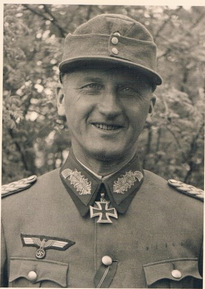Schneider, Dipl.-Ing., Erich (14. Inf.Div.)
- Date of birth:
- August 12th, 1894 (Biedenkopf/Hesse, Germany)
- Date of death:
- August 3rd, 1980 (Wiesbaden/Hesse, Germany)
- Nationality:
- German
Biography
Promotions:
July 14th, 1915: Leutnant;
September 1st, 1923: Oberleutnant
April 1st, 1928: Hauptmann
November 1st, 1934: Major
August 1st, 1937: Oberstleutnant
January 1st, 1940: Oberst;
January 1st, 1943: Generalmajor;
July 1st, 1943: Generalleutnant.
Do you have more information about this person? Inform us!
- Period:
- Second World War (1939-1945)
- Awarded on:
- June 24th, 1941
Already received the Iron Cross 2nd Class on September 22nd, 1915.
- Period:
- Second World War (1939-1945)
- Awarded on:
- July 16th, 1941
Had already received the Iron Cross 1st Class on October 26th, 1916.
- Period:
- Second World War (1939-1945)
- Rank:
- Generalmajor (Brigadier)
- Unit:
- Kommandeur, 4. Panzer-Division, Heer
- Awarded on:
- May 5th, 1943
1) Encircling and crushing strong Soviet forces despite the threat posed by both of his open flanks. In doing so he also closed a gap in the frontline southwest of Orel.
2) Closing another gap in the frontline, created in February 1943, between the 2. and 2. Panzer-Armeen. He and his division did this via an attack from Novgorod Serverskiy towards Ssevsk in the time period 08-27.03.1943.
- Period:
- Second World War (1939-1945)
- Rank:
- Generalleutnant (Major-general)
- Unit:
- Kommandeur, 14. Infanterie-Division, Heer
- Awarded on:
- March 6th, 1945
Awarded for his successful command of the 14. Infanterie-Division during the five-day long battle west, NW and NE of Ostrolenka, which saw repeated Soviet onslaughts defeated with the result that the attempted hpsto;e breakthrough could be prevented. Vital for the German success here was the leadership of Schneider himself. In every difficult moment he was to be found right at the front despite heavy Soviet fire, and was thus able to make his decisions based on a clear understanding of the situation as well as provide an inspiring example to his troops.
768th Award.
768th Award.
- Period:
- Second World War (1939-1945)
- Period:
- Second World War (1939-1945)
- Period:
- Second World War (1939-1945)
- Period:
- Second World War (1939-1945)
- Period:
- Second World War (1939-1945)
- Period:
- Second World War (1939-1945)
- Period:
- Second World War (1939-1945)













